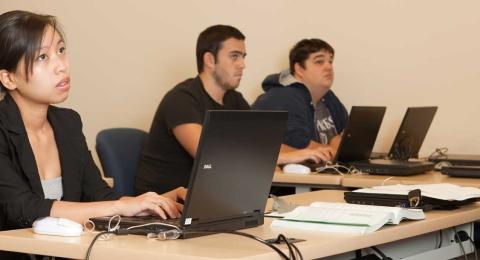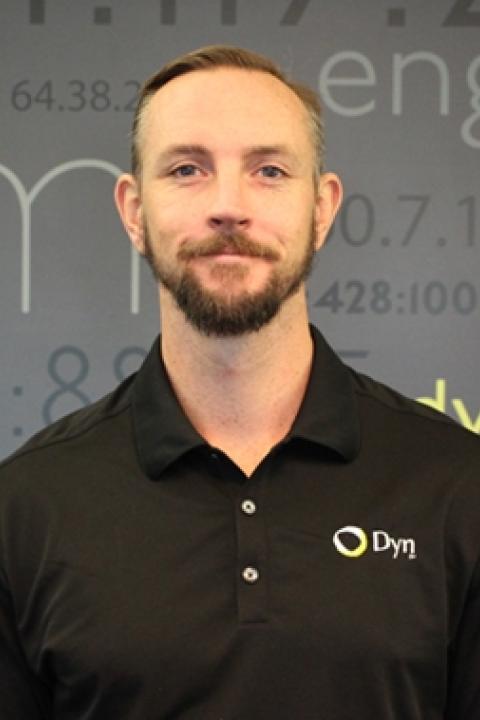Add breadth to your degree by gaining the technical skills that employers in all industries look for
What is an applied computing minor?
Fusing the theory and application of computer science, the applied computing minor develops technical knowledge and real-world skills in IT, programming languages, web development and more. Applied computing focuses on critical thinking and problem solving, which prepares students from all majors with skills that can contribute to the mission of virtually any organization.
Why study applied computing at UNH Manchester?
Led by faculty who are experts in the field, the applied computing minor will help you develop the technical skills that employers in all industries look for. From programming to web design to network architecture, you’ll learn foundational knowledge and practical computing skills in a hands-on environment. You’ll also build the critical thinking, technical and problem-solving skills that are valuable in virtually all industries.
Potential careers
- Applications architect
- Big data engineer
- Computer network architect
- Data security analyst
- Database developer
- Full stack developer
- Information security analyst
- Mobile application developer
- Software engineer
- Software systems engineer
Curriculum & Requirements
Fusing the theory and application of computer science, the applied computing minor develops technical knowledge and real-world skills in IT, programming languages, web development and more. Applied computing focuses on critical thinking and problem solving, which prepares students from all majors with skills that can contribute to the mission of virtually any organization.
Academic policies related to Minors.
- The minor requires five COMP courses (20 credit hours).
- Students must earn grades of at least C- in each course and maintain an overall GPA of 2.0 in minor courses.
- Transfer students may transfer up to two courses, subject to the approval of the minor supervisor.
- Courses taken on a pass/fail basis may not be used for the minor.
- No more than 8 credits used by the student to satisfy major requirements may be used in the minor.
| Code | Title | Credits |
|---|---|---|
| Required Courses | ||
| COMP 405 | Introduction to Web Design and Development | 4 |
| or COMP 415 | Mobile Computing First and For Most | |
| COMP 424 | Applied Computing 1: Foundations of Programming | 4 |
| COMP 525 | Data Structures Fundamentals | 4 |
| Select two courses from the following: | 8 | |
COMP 430 | Systems Fundamentals | |
COMP 500 | Discrete Structures | |
COMP 520 | Database Design and Development | |
COMP 530 | Machine and Network Architecture | |
COMP 625 | Data Structures and Algorithms | |
| Total Credits | 20 | |
Explore Program Details
-
Associate Professor/Affiliate Associate ProfessorEmail: Michael.Jonas@unh.eduPhone: (603) 641-4352
Two large labs set up with peer programming and shared learning in mind, stocked with:
- 16 Dell Latitude E6420 and14 Dell Latitude E4500 with a dual-booting configuration to run Windows 7 and Fedora 17.
- Additional external USB monitor and keyboard and two mice for each Dell Latitude E6420 to improve collaboration on team projects.
- 60 dedicated Ethernet data ports to allow for network design experiments.
- Wireless access for all 30 client computers and any personal computing device that students bring in.
A spacious server room equipped with:
- Three Dell PowerEdge server computers, Ethernet data ports, and networking gear to provide instructional support for the Computing Technology courses.
-
A stack of 10 Dell PowerEdge server computers running a Linux server operating system to run experiments in the Capstone Project course.
-
Four monitoring consoles to optimize system and network administrative operations.
Two server clusters:
- Speech Server Cluster consisting of a stack of 12 Dell PowerEdge servers running Red Hat Linux server operating system to run Speech experiments in the Capstone Project course.
- GPU Computing Cluster is under construction, made possible with a recent grant from NVIDIA, the world leader in visual computing. The state-of-the-art cluster will allow students to analyze medical imagery, explore models of speech and leverage GPU computing and CUDA C/C++ in their courses.
Our lab laptops are powerful development platforms configured to run a large variety of tools and utilities. Visit our Lab Laptops Software wiki page for a complete list of installed software products.
- A private cloud of four to eight virtual machines running Windows and Linux server operating systems, managed with VMware vSphere, is updated each semester to meet course instruction and student project needs.
- Server applications and run-time environments (BinNami and XAMPP) are configured to provide MediaWiki, Apache web, and MySQL database services.
- Shared network drives and staging server virtual machines support student project activities.
- OpenComputing public wiki, set up to share computing resources and document student projects.
- A Balsamiq academic license offers mockup building tools to design user experiences for course projects.
- A Microsoft Developer Network Academic Alliance (MSDN AA) membership gives students access to Microsoft developer and designer tools software.





